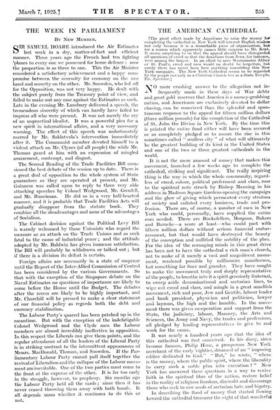THE WEEK IN PARLIAMENT
BY NEW MEMBER.
SIR SAMUEL HOARE introduced the Air Estimates last week in a dry, matter-of-fact and efficient trimmer. Three years ago the French had ten fighting 'planes to every one we possessed for home defence : now the proportion is as 'three to one. This the Air Minister considered a satisfactory achievement and a happy com- promise between the necessity for economy on the one hand and security on the other. Mr. Snowden, who led off for the Opposition, was not very happy. lie dealt with the subject purely from the Treasury point of view, and failed to make out any case. against the Estimates as such. Late in the evening Mr; Lansbury delivered a speech, the tremendous sincerity of which can hardly have failed to impress all who were present. It was not merely the cry of an unpractical idealist. It was a powerful plea for a new spirit in international affairs, and a very necessary warning. The effect of this speech was unfortunately marred by 'Mr. Saklatvala's intervention immediately after it. The Communist member devoted himself to a violent attack on Mr.' Clynes (of all people) the while Mr. 'Thomas gazed at him with an expression of mingled amazement, contempt, and disgust.
The Second Reading of the Trade Facilities Bill occa- sioned the best debate of the session up to date. There is a great deal of opposition to the whole system of State guarantees as they are operated at present, and Mr. Guinness was called upon to reply to three very able attacking speeches by Colonel Wedgwood, Mr. • Grenfell, and Mr. Runciman. He did so in a very half-hearted manner, and it is probable that Trade Fadilities Acts will gradually disappear from the statute book. They combine all the disadvantages and none of the advantages of Socialism.
The Cabinet decision against the Political Levy Bill is warmly welcomed by those Unionists who regard the measure as an attack on the Trade Unions and as such fatal to the cause of industrial peace ; and the attitude adopted by Mr. Baldwin has given immense satisfaction. The Bill will probably be withdrawn or talked out ; but if there is a division its defeat is certain.
Foreign affairs are necessarily in a state of suspense until the Report of the Inter-Allied Commission of Control has been considered by the various Governments. So that with the exception of the Singapore debate on the Naval Estimates no questions of importance are likely to come before the House until the Budget. The debates after the recess are likely to be highly important, and Mr. Churchill will be pressed to make a clear statement of our financial policy as regards both the debt and currency stabilization.
The Labour Party's quarrel has been patched up in the meantime. But with the exception of the indefatigable Colonel Wedgwood and the Clyde men the Labour members are almost incredibly ineffective in opposition. In this respect the Liberals can give them points, and the regular attendance of all the leaders of the Liberal Party is in striking contrast to the intermittent appearances of Messrs. MacDonald, Thomas, and Snowden. If the Par- liamentary Labour Party cannot pull itself together the revival of Liberalism and the collapse of the Labour move- ment are inevitable. One of the two parties must come to the front at the expense of the other. It is far too early in the struggle, however, to prophesy. Six months ago the Labour Party held all the cards ; since then it has never ceased throwing them away with both hands. It all depends upon whether it continues to do this or not.


























































 Previous page
Previous page